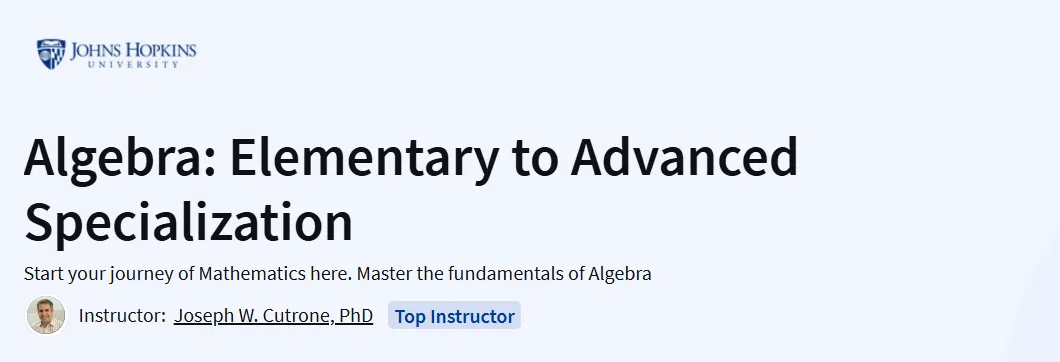What you will learn in the Algebra: Elementary to Advanced Specialization Course
- Solve linear, quadratic, polynomial, and exponential equations.
- Understand properties of real, rational, and irrational numbers.
- Analyze functions: graphs, domains, ranges, intercepts, and asymptotes.
- Apply algebraic concepts to model data, reason logically, and evaluate arguments.
Program Overview
Algebra: Elementary to Advanced – Equations & Inequalities
⏳ 10 hours
- Covers real numbers, equalities, inequalities, polynomials, rational expressions and equations, graphs, relations and functions, radicals and exponents, and quadratic equations.
Algebra: Elementary to Advanced – Functions & Applications
⏳ 5 hours
Reviews the concept of a function and provides examples of common and uncommon types of functions used in various disciplines.
Algebra: Elementary to Advanced – Polynomials and Roots
⏳ 5 hours
Focuses on polynomials, their properties, and methods for finding their roots.
Get certificate
Job Outlook
Enhances language proficiency for careers in data science, engineering, economics, and finance.
Provides a solid foundation for advanced studies in mathematics and related disciplines.
Completing this specialization can bolster qualifications for roles requiring strong analytical and problem-solving skills.
Explore More Learning Paths
Take your algebra skills from the basics to advanced concepts with these carefully selected courses and resources. Whether you want to strengthen your foundation or explore practical applications, these learning paths will support your growth.
Related Courses
Introduction to Linear Algebra
Build a strong understanding of linear algebra concepts, including vectors, matrices, and systems of equations, essential for advanced mathematics and data applications.Matrix Algebra for Engineers
Learn practical matrix operations and applications that are widely used in engineering, data science, and analytical problem-solving.Learn Algebra the Easy Way
Reinforce your algebra foundation with clear explanations, step-by-step examples, and practical exercises for mastery from beginner to advanced levels.
Related Reading
What Is Python Used For
Explore how algebra is applied in Python programming, data science, and machine learning, connecting mathematical concepts to real-world coding projects.
Specification: Algebra: Elementary to Advanced Specialization Course
|
FAQs
- No, the course starts with elementary concepts and builds step by step.
- It’s suitable for both beginners and those refreshing old knowledge.
- Basic arithmetic familiarity is helpful but not mandatory.
- The specialization is structured to guide learners from simple to complex.
- School algebra often focuses only on passing exams.
- This course emphasizes understanding concepts deeply.
- It covers broader applications relevant to real-world problem solving.
- The step-by-step approach prepares you for higher math and technical fields.
- Yes, algebra supports careers in science, engineering, finance, and computer science.
- Data analysis and coding often rely on algebraic thinking.
- Improves problem-solving and logical reasoning in any career.
- Employers value strong analytical and quantitative skills.
- Absolutely—algebra is the foundation for calculus, statistics, and data science.
- Helps you understand equations, functions, and transformations.
- Builds confidence before moving into higher-level math.
- Ensures you’re prepared for technical fields like AI, ML, and engineering.
- Stronger logical reasoning and structured problem-solving.
- Better ability to analyze patterns and relationships in data.
- Confidence in handling technical subjects and quantitative tasks.
- A solid math foundation for academic or career advancement.





